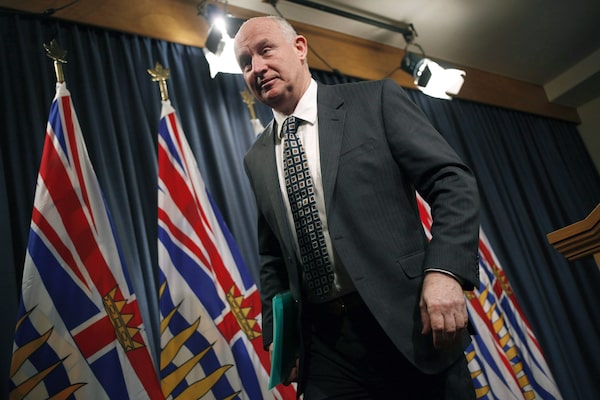
Public Safety Minister Mike Farnworth leaves the podium after speaking at a press conference in Victoria, B.C., on Feb. 5, 2018.CHAD HIPOLITO/The Canadian Press
The British Columbia government will conduct an independent review of its operational response to the COVID-19 pandemic to help it prepare and respond to emergencies.
Public Safety Minister Mike Farnworth has appointed a three-person team, including two former deputy ministers and a public policy consultant, to do the review.
A news release from the ministry said the team’s consultations will include government agencies, First Nations, independent regulators and others to determine what worked and what can be improved.
It is also accepting written feedback from residents until April 20 about how they or their business have been affected by measures taken by the province.
The ministry said the scope of the review does not include an assessment of public policy, provincial health or economic recovery decisions, but it will look at how those choices were made.
The report is expected by the fall.
The team conducting the review consists of Bob de Faye, Dan Perrin and Chris Trumpy. Trumpy and de Faye are former deputy ministers, while Perrin also worked in the public service before founding public policy analysis firm Perrin, Thorau and Associates Ltd. in 1994.
Tom Koch, a medical geographer at the University of B.C., said more research is needed into why the government wasn’t ready to respond to a pandemic when disease mapping experts like him have been warning about it for years.
“They’re writing this report, which is guaranteed to be minimally useful and politically correct, but the real question is why we were not better prepared,” he said. “I don’t care how you pulled the drowning guy out of the water. I want to know why he was in the water in the first place.”
Koch said it may work as an “interim report” but he is calling for additional analysis into the government’s response by viral disease experts.
“The issue of a disease and epidemic spread is more than a matter of policy. It’s also a fairly technical issue,” he said.
Stephen Hoption Cann, a clinical professor and epidemiologist at the University of British Columbia’s school of population and public health, agreed the government should been better prepared, but said the review will allow policy-makers to learn from their mistakes and better prepare for future health crises.
“One things that we didn’t learn from before this pandemic was that we already had a SARS pandemic and that told us the virus was airborne,” he said. “A lot of people didn’t focus a lot on how the virus spread previously and that would have helped us make more effective decisions early on.”
Communication to the public is another area that could have been improved, particularly as the virus evolved, he said.
Hoption Cann said the government also needs to pay attention to the unintended consequences of policy decisions, including its impacts on mental health, the opioid crisis and the economy.
“The strategy for a short period of time is very different from a long period of time because people kind of get tired of restrictive measures after a while,” he said. “The decisions were a mix of science and politics, it has to be that way, and it’s important to realize that everybody was trying to do the best they could under the circumstances.”
This story was produced with the financial assistance of the Facebook and Canadian Press News Fellowship.
We have a weekly Western Canada newsletter written by our B.C. and Alberta bureau chiefs, providing a comprehensive package of the news you need to know about the region and its place in the issues facing Canada. Sign up today.